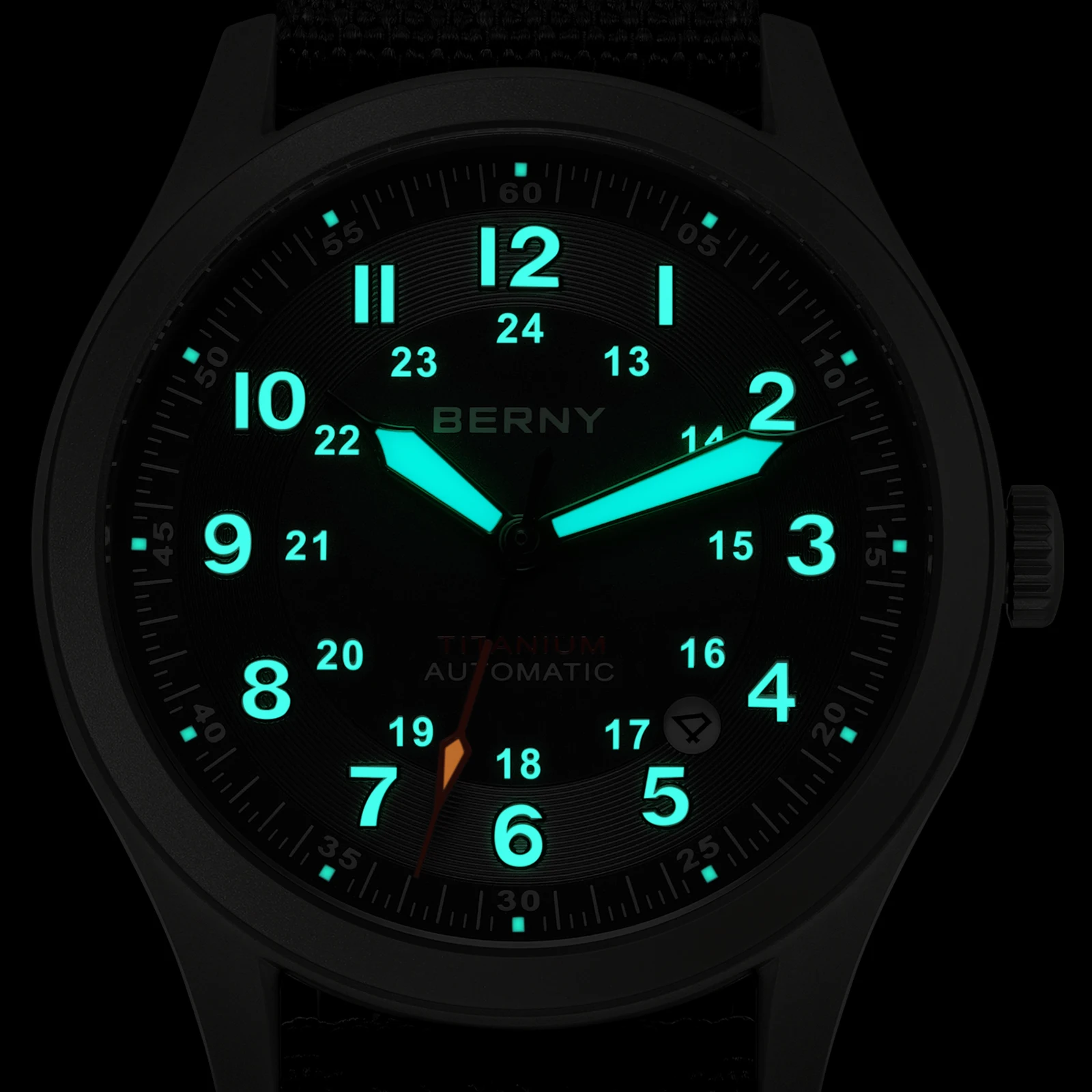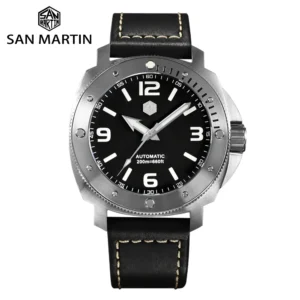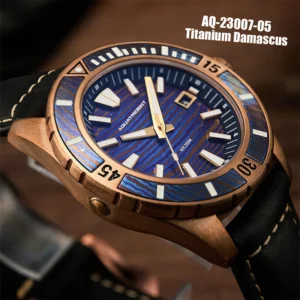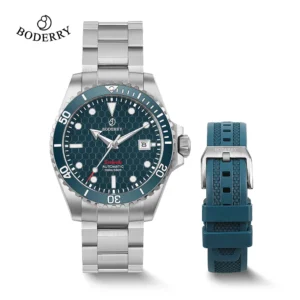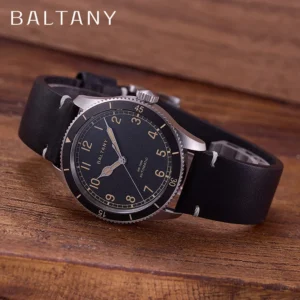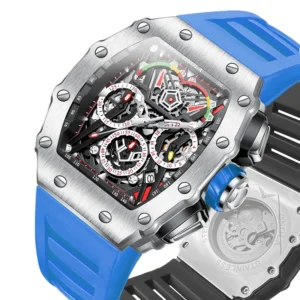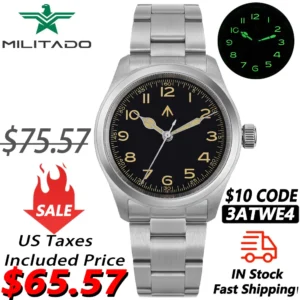Introduction: Why Titanium Revolutionizes Rugged Timepieces
Titanium has emerged as a game-changing material in the world of premium watchmaking, transforming from a specialist metal reserved for aerospace and military applications into one of horology’s most sought-after materials. This remarkable metal offers watch enthusiasts an unparalleled combination of attributes that make it perfectly suited for rugged timepieces designed to withstand demanding environments.
The true power of titanium lies in its exceptional balance of qualities:
- 45% lighter than steel while maintaining comparable strength
- Superior corrosion resistance against elements that quickly damage other metals
- Remarkable comfort even during extended wear in challenging conditions
- Natural hypoallergenic properties for sensitive skin
For the discerning watch enthusiast who demands both performance and wearability, titanium represents the pinnacle of material science applied to rugged timepieces. As you’ll discover, titanium’s unique properties make it worth considering for anyone seeking a watch that can truly withstand life’s adventures.
The history of dive watch engineering reveals how titanium’s adoption marked a significant turning point for watches designed to perform in extreme conditions.
Essential Properties of Titanium in Watchmaking
Understanding what makes titanium special requires examining the specific properties that set it apart from traditional watchmaking materials. These characteristics combine to create timepieces that excel in challenging environments while remaining comfortable for daily wear.
Exceptional Strength-to-Weight Ratio
Titanium achieves the remarkable feat of being approximately 45% lighter than stainless steel while maintaining comparable strength. This means a titanium watch case can provide the same structural integrity and protection as steel while significantly reducing the weight on your wrist.
Superior Corrosion Resistance
Titanium naturally forms a protective oxide layer (TiO₂) when exposed to air. This microscopically thin barrier self-heals when scratched and provides exceptional protection against:
– Saltwater
– Acids
– Industrial chemicals
– Bodily fluids like sweat
Biocompatibility and Hypoallergenic Nature
Unlike many metals used in watchmaking, titanium contains no nickel or other common allergens. This makes it one of the few metals that almost never causes skin irritation or allergic reactions, earning it widespread use in medical implants.
Thermal Properties
Titanium exhibits low thermal conductivity, meaning it doesn’t quickly take on the temperature of its surroundings. This translates to a watch that won’t feel uncomfortably cold against your skin in winter or hot in summer.
Non-Magnetic Properties
Titanium’s non-magnetic nature protects watch movements from magnetic interference that can affect timekeeping accuracy, an increasingly important consideration in our electronics-filled world.
The comprehensive titanium watch guide explaining properties and benefits provides deeper insight into these characteristics. For visual examples, browse our collection of titanium automatic watches showcasing these properties in action.
Strength-to-Weight Ratio: The Defining Advantage
The most immediately noticeable benefit when first wearing a titanium timepiece is its remarkable lightness. This isn’t merely a matter of comfort—it represents a fundamental engineering advantage that transforms the wearing experience, especially for larger watch designs.
A typical 42mm dive watch in titanium might weigh 30-40% less than its stainless steel counterpart while maintaining identical structural integrity. This weight reduction dramatically improves wearability during extended periods, whether you’re typing at a desk or swimming against ocean currents.
The psychological impact shouldn’t be underestimated either. Many watch enthusiasts initially worry that a lightweight watch might feel “cheap” or insubstantial. However, titanium creates a unique wearing experience—present enough to feel secure and substantial, yet light enough to forget you’re wearing it during active pursuits.
This perfect balance makes titanium ideal for larger case designs that would be prohibitively heavy in steel. The rugged automatic watches in our collection demonstrate how titanium enables robust protection without compromising comfort.
Corrosion Resistance: Performance in Extreme Environments
Titanium’s exceptional resilience against corrosive elements makes it the material of choice for watches intended for challenging environments. This resistance isn’t a coating or treatment that can wear away—it’s an intrinsic property of the metal itself.
When exposed to oxygen, titanium instantly forms a protective titanium dioxide (TiO₂) layer just a few nanometers thick. This invisible shield provides remarkable protection against:
- Saltwater immersion, making it perfect for diving and marine environments
- Perspiration during intense athletic activities or in hot climates
- Chlorinated pool water that can damage other metals over time
- Industrial chemicals and environmental pollutants
Most impressively, this protective layer self-heals when damaged, continuously renewing the watch’s protection. The practical benefit is a timepiece that maintains its appearance and structural integrity for decades, even with regular exposure to corrosive elements.
The engineering behind adventure watch cases explores how titanium’s corrosion resistance makes it ideal for timepieces designed to withstand nature’s harshest conditions.
Temperature Resistance and Thermal Comfort
One of titanium’s less discussed but immediately noticeable benefits is its thermal behavior. With a thermal conductivity significantly lower than stainless steel, titanium watches don’t quickly adopt the temperature of their surroundings.
In practical terms, this means your watch won’t feel uncomfortably cold against your skin when you step outside on a winter morning or hot when exposed to summer sun. For outdoor enthusiasts and travelers experiencing varied climates, this thermal stability translates to noticeably improved comfort.
Beyond comfort, titanium’s exceptional stability across extreme temperature ranges ensures consistent performance. While other metals may expand, contract, or become brittle in extreme conditions, titanium maintains its structural integrity from arctic cold to desert heat.
Our collection of automatic field and military watches features timepieces designed to perform flawlessly across these temperature extremes.
Hypoallergenic Benefits for All-Day Wear
For individuals with sensitive skin or metal allergies, titanium offers a solution that few other watch materials can match. Its hypoallergenic properties stem from its biocompatible nature—the same characteristics that make titanium the preferred material for medical implants.
Unlike many watch case materials, titanium contains no nickel, which is the most common metal allergen affecting approximately 10-20% of the population. This makes titanium watches uniquely suitable for those who have experienced skin irritation, rashes, or discomfort when wearing traditional watches.
The biocompatibility extends beyond allergy prevention—titanium creates no adverse reactions with skin even during extended contact in high-perspiration situations. For active individuals or those living in humid climates, this means comfortable wear without the skin irritation that can occur with other metals after prolonged exposure to moisture.
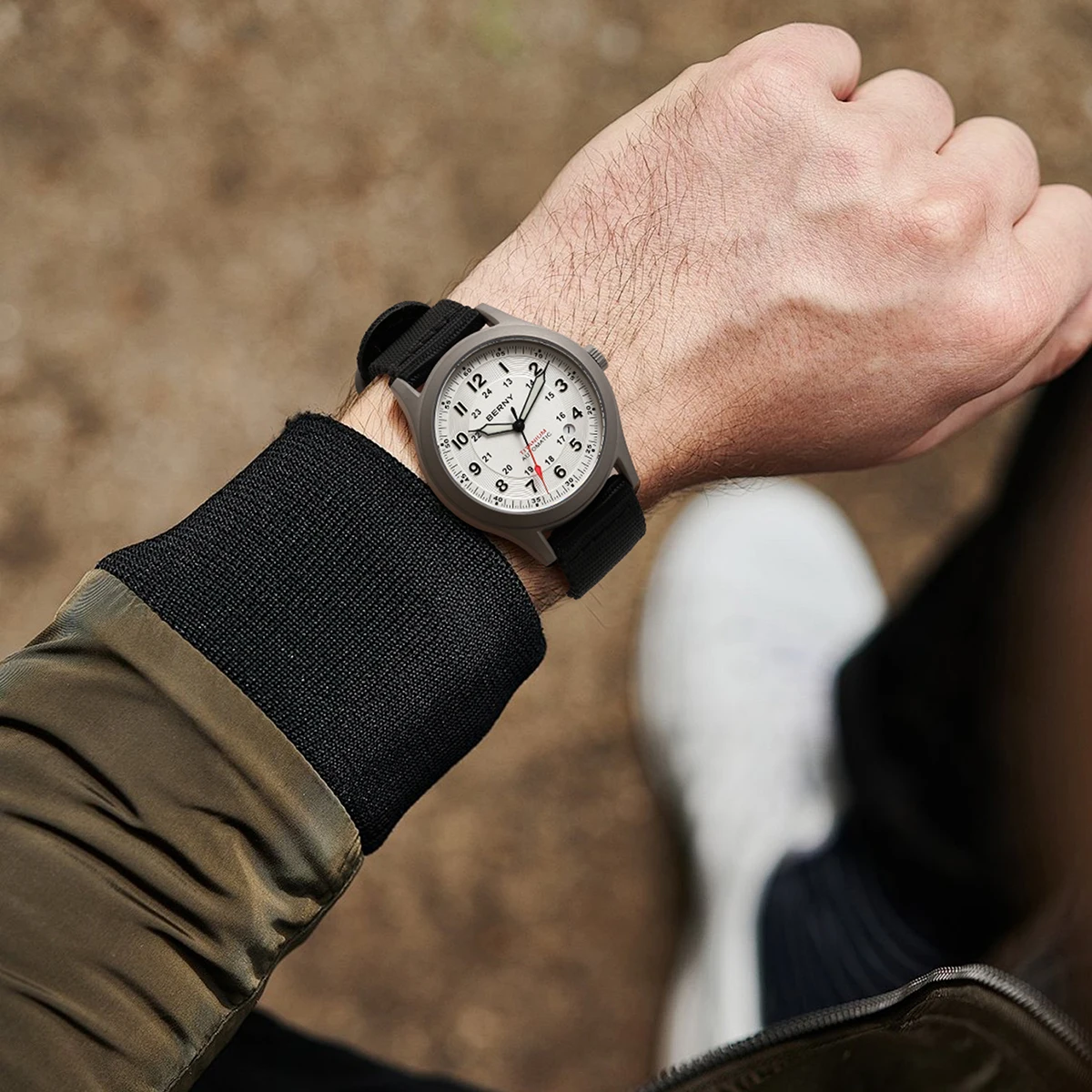
Titanium Grades and Their Performance Differences
Not all titanium watches are created equal. The grade of titanium used significantly impacts performance, appearance, and price. Understanding these differences helps you make an informed decision when selecting a titanium timepiece.
| Titanium Grade | Composition | Hardness (Vickers) | Primary Benefits | Typical Applications |
|---|---|---|---|---|
| Grade 2 (Commercially Pure) | 99% titanium | 150-180 HV | Lower cost, excellent corrosion resistance | Entry and mid-level titanium watches |
| Grade 5 (Ti-6Al-4V) | 90% titanium, 6% aluminum, 4% vanadium | 300-350 HV | Higher strength, better scratch resistance | Premium sport and professional watches |
| Proprietary Alloys | Varies by manufacturer | 400+ HV | Enhanced hardness, specialized properties | Luxury and technical timepieces |
Grade 2 titanium, while offering excellent corrosion resistance and lightweight properties, is softer and more prone to scratching. Grade 5 titanium alloy provides substantially improved hardness and scratch resistance at a higher cost. Many premium watch manufacturers use Grade 5 or develop proprietary titanium alloys with enhanced performance characteristics.
When examining a titanium watch, the grade isn’t always explicitly stated in marketing materials. However, price point can provide clues—watches using Grade 5 titanium typically command a price premium over those using Grade 2.
The evolution of dive watch technology has been significantly influenced by advancements in titanium metallurgy and processing techniques.
Addressing Titanium’s Scratch Resistance: Facts vs. Myths
Perhaps the most persistent misconception about titanium watches concerns their scratch resistance. Let’s separate fact from fiction:
Myth: Titanium watches are scratch-proof.
Fact: Standard titanium is actually more prone to surface scratches than stainless steel.
This seeming contradiction stems from titanium’s unique properties. While incredibly strong against bending or breaking (tensile strength), titanium—particularly Grade 2—has lower surface hardness than stainless steel. This makes it more susceptible to the surface scratches that occur during everyday wear.
However, titanium scratches differ from those on steel in a crucial way: they tend to be less visually prominent. Titanium’s natural color means scratches often appear as lighter marks rather than the deep, dark scratches visible on polished steel.
Modern watchmakers address titanium’s scratch vulnerability through several approaches:
- Using harder Grade 5 titanium alloy instead of commercially pure Grade 2
- Applying Diamond-Like Carbon (DLC) or other hardening coatings
- Employing surface hardening treatments that modify the metal’s outer layer
- Utilizing brushed or matte finishes that make minor scratches less noticeable
For comprehensive information about durability factors in challenging environments, the guide to understanding durability factors in rugged watches provides valuable context.
Titanium vs. Stainless Steel: The Complete Comparison
When choosing a watch material, the most common decision comes down to titanium versus stainless steel. Each offers distinct advantages that may align better with different lifestyles and preferences.
| Factor | Titanium | Stainless Steel |
|---|---|---|
| Weight | 40-45% lighter than steel | Approximately twice the weight of titanium |
| Strength | High strength-to-weight ratio | High absolute strength |
| Corrosion Resistance | Exceptional resistance to saltwater and chemicals | Good resistance, but can corrode with prolonged exposure |
| Scratch Resistance | More prone to surface scratches (Grade 2) | Better resistance to everyday scratches |
| Hypoallergenic | Naturally hypoallergenic, no nickel | Often contains nickel, potential allergen |
| Thermal Properties | Low conductivity, stays comfortable | High conductivity, quickly adopts ambient temperature |
| Appearance | Natural gray tone, matte finish | Brighter, more reflective finish |
| Cost | 20-30% premium over comparable steel models | Generally more affordable |
| Maintenance | Minimal maintenance requirements | May require more attention to prevent corrosion |
The ideal choice depends on your priorities. Titanium excels for:
– Active lifestyles where weight matters
– Exposure to corrosive environments (diving, swimming)
– Those with sensitive skin or metal allergies
– Extended wearing periods where comfort is paramount
Stainless steel might be preferable when:
– Budget considerations are primary
– Traditional polished appearance is desired
– Maximum scratch resistance is needed
– Heavier weight is preferred
Understanding why titanium is used in watches provides additional insights into this material choice. Our collection of tactical automatic watches demonstrates how titanium’s advantages are leveraged in real-world applications.
Military Inspired Automatic Watches, Rugged Automatic Watches, Tactical Automatic Watches
Price range: $852.14 through $994.60 Select options This product has multiple variants. The options may be chosen on the product pageBronze Automatic Watches, Military Inspired Automatic Watches, Professional Spec Dive Watches
Price range: $1,442.21 through $1,442.82 Select options This product has multiple variants. The options may be chosen on the product pageProfessional Spec Dive Watches, Titanium Automatic Watches
$574.74 Select options This product has multiple variants. The options may be chosen on the product pageClassic Pilot Watches, Military Inspired Automatic Watches
$561.00 Select options This product has multiple variants. The options may be chosen on the product pageRugged Automatic Watches, Unique Automatic Watches
Price range: $228.96 through $231.10 Select options This product has multiple variants. The options may be chosen on the product pageClassic Field Watches, Military Inspired Automatic Watches
Price range: $280.87 through $338.51 Select options This product has multiple variants. The options may be chosen on the product page
Is a Titanium Watch Worth the Investment?
When considering the 20-30% price premium typically associated with titanium watches, many enthusiasts question whether the benefits justify the additional cost. The answer depends on both practical considerations and personal preferences.
From a purely practical perspective, titanium watches offer exceptional value for active individuals and those who expose their timepieces to challenging environments. The combination of reduced weight, superior corrosion resistance, and hypoallergenic properties creates a wearing experience that simply can’t be matched by other materials.
The longevity factor also weighs in titanium’s favor. While the initial investment is higher, titanium watches typically maintain their structural integrity and appearance longer than their steel counterparts when exposed to corrosive elements, potentially offering better value over the lifetime of the watch.
Beyond practical benefits, titanium provides an intangible value through its unique wearing experience. The remarkable lightness combined with strength creates a distinct feel that many enthusiasts come to prefer after experiencing it. This sensation—substantial yet never burdensome—represents a refined approach to watchmaking that prioritizes both performance and comfort.
Titanium Watch Care and Maintenance Tips
Proper care ensures your titanium timepiece maintains its appearance and performance for decades. While generally low-maintenance, titanium benefits from specific attention:
Cleaning: Rinse with fresh water after exposure to saltwater or chemicals. A mild soap solution and soft cloth are sufficient for regular cleaning.
Handling scratches: Minor scratches in titanium often appear lighter than the surrounding metal. Many can be minimized using titanium-specific polishing cloths, though deep scratches require professional attention.
Avoiding harsh chemicals: While highly resistant to corrosion, titanium can be affected by certain industrial chemicals. Avoid contact with strong acids or bleach.
Storage: Store your titanium watch away from other metal objects to prevent scratching. Soft watch rolls or cases are ideal.
Professional service: Follow the manufacturer’s recommended service intervals. Though titanium cases are durable, the movement inside requires regular maintenance.
Unlike steel watches, titanium timepieces don’t require frequent polishing to maintain their appearance. In fact, the natural matte finish of titanium often looks best when allowed to develop a subtle patina that reflects your wearing experience.
The timeline of diving watch innovations shows how maintenance requirements for titanium watches have evolved alongside manufacturing techniques.
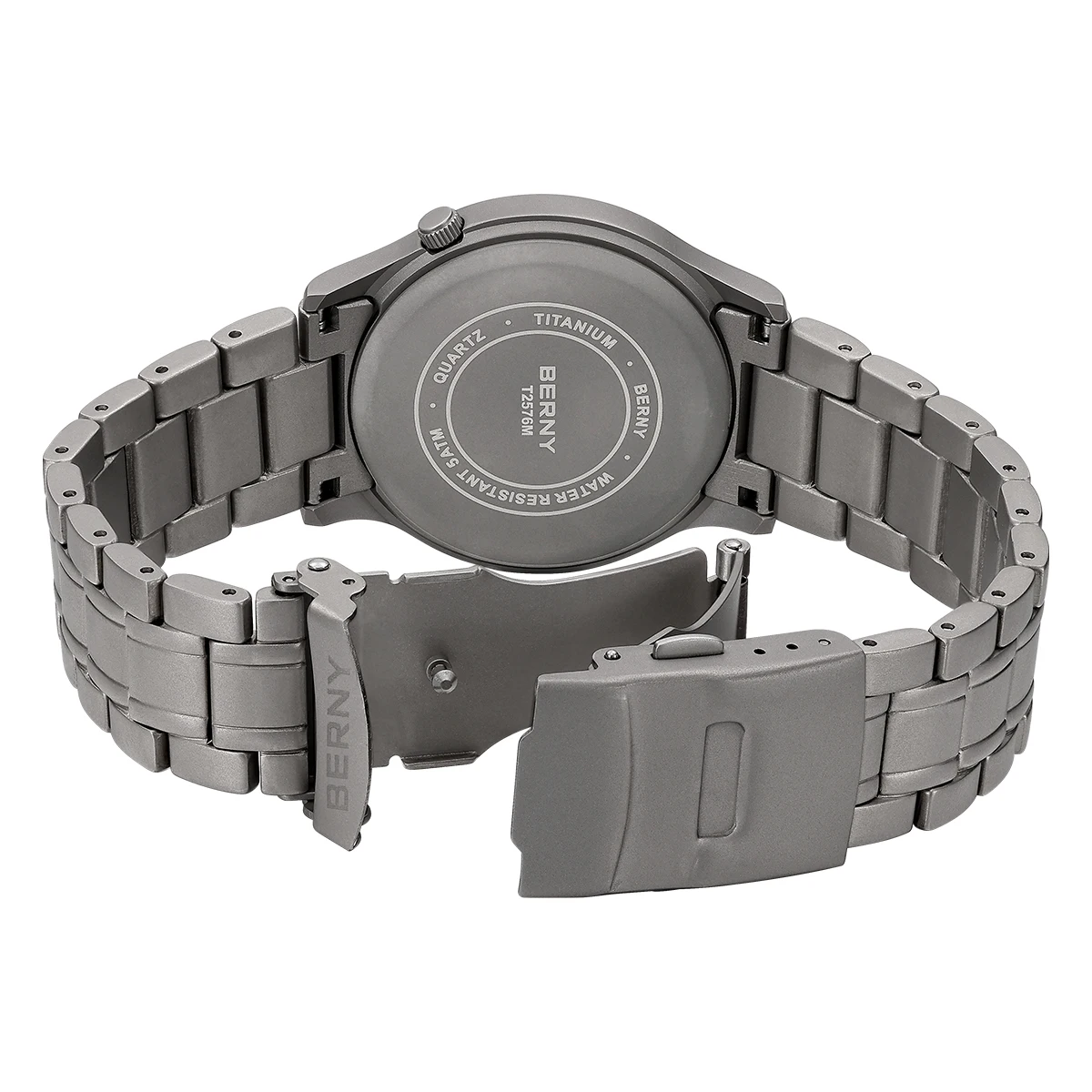
Frequently Asked Questions About Titanium Watches
Can titanium watches be polished or refinished?
Yes, but with limitations. Titanium requires specialized polishing techniques different from those used for steel. While light scratches can often be buffed out by professionals, maintaining the original finish perfectly is more challenging than with stainless steel. Many manufacturers offer refinishing services.
Do titanium watches fade or change color over time?
Pure titanium does not fade or discolor with age. The protective oxide layer that forms on titanium is stable and maintains its appearance indefinitely. Any perceived darkening is typically just accumulated dirt that can be cleaned away.
How can I identify what grade of titanium my watch uses?
Manufacturers of premium watches typically specify the titanium grade in their technical specifications or marketing materials. Grade 5 titanium is often explicitly mentioned as a selling point due to its superior hardness. If not stated, watches in the entry to mid-range price segment typically use Grade 2, while high-end watches more commonly feature Grade 5.
Are titanium watches suitable for everyday wear?
Absolutely. Their lightweight comfort, scratch and corrosion resistance, and hypoallergenic properties make titanium watches excellent for daily use. Many wearers report that once accustomed to titanium’s lightness, returning to heavier metals feels uncomfortable.
Our collection of military-inspired automatic watches demonstrates how titanium performs in everyday scenarios while maintaining tactical-inspired durability.
Final Thoughts: When to Choose Titanium for Your Next Rugged Watch
Titanium stands as the ultimate material choice for those who demand the highest performance from their timepieces in challenging environments. Its unmatched combination of lightweight comfort, exceptional corrosion resistance, and hypoallergenic properties creates watches that truly excel when put to the test.
The ideal candidate for a titanium watch is someone who values performance over tradition, comfort over heft, and durability over conventional luxury signals. Whether you’re an outdoor enthusiast facing the elements, a frequent traveler crossing climate zones, or simply someone who appreciates innovative materials engineering, titanium offers tangible benefits that enhance the daily wearing experience.
As watchmaking technology continues to advance, titanium’s role in premium timepieces will likely expand, bringing its remarkable properties to even more discerning enthusiasts who understand that true luxury in a watch comes not just from its appearance, but from how it performs throughout life’s adventures.
For more information about protecting your investment, our guide to mastering case protection in tactical timepieces provides valuable insights specific to titanium watches.

